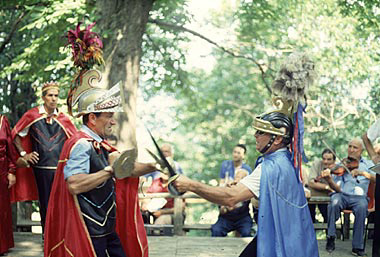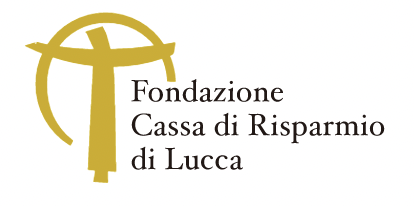
Every summer, the Rassegna del Maggio presents a selection of plays which are put on by the various Maggi Companies of the Garfagnana and Emilia. “Maggio” is a form of popular theatre diffused in the Tuscan and Emilian apennine zone and has a very ancient, complex and stratified history. The performance, that usually has the form of an encounter between two opposing sides (often Turks V’s Christians), begins with a procession of the “Maggianti” (the name given to the actors). On the sound of the orchestra they mark out the space where the dramatic action is to take place. The performers acting is usually stylized and their gestures have symbolic value. For example, an actor who walks very slowly makes us understand that he’s on a journey. The “maggianti” sing their parts in closely defined metric rhyme which generally derives from the type used in traditional Italian poetry (octaves, fifths, quatrines, octaves and hendecasyllables). The plots are often based on classic Italian epic literature such as Orlando Furioso or Gerusalemme Liberata. The Centre for Popular Traditions of the Province of Lucca take care of the event in collaboration with the companies of “maggianti”, who have the merit of keeping this tradition alive. The Provinces of Lucca and Reggio Emilia along with the Mountain Communities of the Garfagnana and the Appennino Reggiano, and the Council of Villa Minozzo contribute to the carrying out of the event.
August 1st
at 15.00 – ASTA (RE)
Compagnia “Monte Cusna” di Asta
Maggio Epico
at 15.00 – ROMANORO (MO)
Compagnia “Val Dolo”
“I fratelli ammutinati” di Tranquillo Turrini
at 15.30 Varliano – GIUNCUGNANO (LU)
Compagnia di Gragnanella – Filicaia – Casatico
“Costantino, imperatore greco”, Piergiorgio Lenzi
at 16:00 Guzzanello (Partigliano) – BORGO A MOZZANO (LU)
Mini review in memory of Aldo Nicoletti
Gruppo Folclorico di Pieve di Compito
“Né per scherzo, né per burla” di Marco Nicolosi (zingaresca)
Gruppo musici e cantori “Bel Castello” di Partigliano
Folk songs
Details:
F. Baroni, Maggio . Ipotesi su un fenomeno di teatro popolare, Catalogo della mostra
Immagini del maggio, Centro Tradizioni popolari, Lucca 1987
A.Prosperi, La religione della Controriforma e le feste del maggio nell”Appennino
tosco-emiliano, in “Critica storica”, XVIII, n. 2, 1981
G. Giannini, Teatro popolare lucchese, Carlo Clausen, 1895
Elisa Gabrielli, Centro Tradizioni Popolari
tel 0583 417297
info@centrotradizionipopolari.it
Centro Tradizioni Popolari della Provincia di Lucca
The present form of the “Maggio” dates back to the 1800’s but the history of this form of theatre goes back much further. The complexity of this argument can be understood by referring to the bibliography. Here, it is sufficient to recall that the political authorities of the Lucchese, Massese and Lunigianese territory between the 17th and 18th century, banned the singing of the “Maggio”. Different factors and traditions contribute to the forming of the Maggio, and have been analysed from different angles in studies concerning its history. D’Ancona has traced the origins of the Maggio to sacred renaissance representations, while Toschi has studied the folkloric aspects tied to fertility rituals in Springtime. Prosperi has highlighted the importance of Jesuit intervention in spreading popular art forms like the “Maggi”, formally prohibited during the Counter Reformation for their unorthodox nature. The traditional festivities tied to nature’s cycles and the theatrical representations connected with them, were reinterpreted in such a way so as to work in favour of the spreading of the official catholic religion. Baroni has underlined the need for a study approach that takes the historical stratification of this art form into account, renouncing any one-sided type of interpretation.





